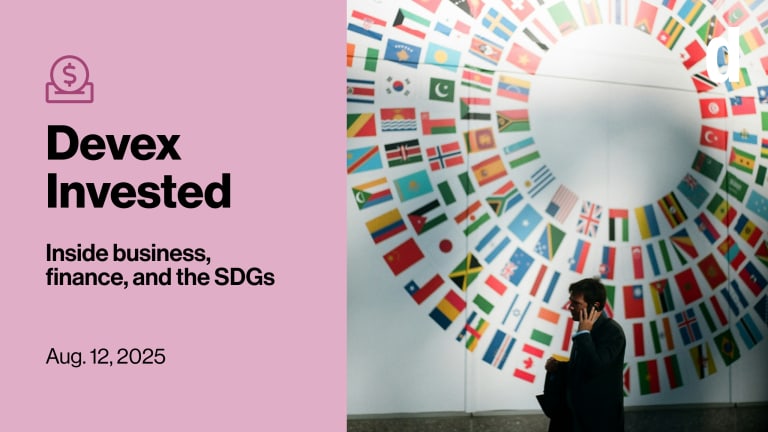A single market for European philanthropy?
Despite a setback in 2015, advocates are continuing the fight to ease cross-border philanthropy in Europe.
BRUSSELS — At the beginning of October, at the end of a long day, in a meeting room off the main thoroughfare inside the European Parliament, a small group met to try to revive an idea: The creation of a single market for European philanthropy. The free movement of capital is enshrined in the treaties that form the legal basis for the European Union. But on Oct. 1, Sven Giegold, a German Greens member of the European Parliament, told the audience of around 50 civil society actors, MEPs, and officials from the European Commission that while the law facilitates pan-European companies, charitable organizations fare much worse. He cited examples of European NGOs and foundations that struggle to attract funding from outside their home country because supporters elsewhere in the EU cannot make donations that are counted as tax-deductible. Ludwig Forrest, co-ordinator of Transnational Giving Europe and an adviser at the King Baudouin Foundation in Brussels, said people who wish to bequeath their legacy in another EU country, or foundations seeking to work across borders, are also hampered by red tape. “The EU makes it easy to make money off of each other, through the single market for goods and services, but makes it very hard to help across borders,” Felix Oldenburg, secretary-general of the Association of German Foundations, told the meeting. “And that is not by design. That is something that can be changed, and it must be changed now.” Many of those present Tuesday have tried before. In 2012, the European Commission proposed a European Foundation Statute, intended to make it easier for foundations to support public benefit causes across the bloc. Hanna Surmatz, from the European Foundation Centre, told Devex that instead of organizations needing to create different legal entities in each EU member state, as is currently the case, the 2012 proposal would have created a “supra-national legal form for non-profit entities to be able to work at a European scale,” creating “a level playing field for larger, Europe-wide initiatives.” The commission dropped the proposal in 2015, however, after lack of agreement between EU member states. One reason, Surmatz said, was that national authorities could not agree on a common European concept of charitable status for the new instrument. “There was maybe not enough trust in each others’ checks and balances, which is in a way a bit weird because we are living in a European Union,” she said. But advocates are still working hard on the idea. The European Philanthropy Manifesto, released earlier this year, sets out the objectives from the Donors and Foundations Networks in Europe and the European Foundation Centre: Greater recognition for philanthropy in the treaties that form the legal basis for the EU; easier cross-border philanthropy, with fewer impediments from rules on tax evasion, money laundering and counter-terrorism financing; and even co-granting and co-investing with public resources. Forrest told Devex that lessons have been learned from the failure of the foundation statute. “We were not well enough organized,” he said. “But we have understood that we should more and more speak as one voice. That is the reason why you have now this Philanthropy Advocacy initiative, a collaboration between DAFNE and EFC.” After a string of cases at the European Court of Justice that challenged the different treatment of donors and foundations between EU countries, a single market for philanthropy should already exist, Forrest said. However, some countries have been slow to adapt their procedures. Data on how much is given in Europe, by whom and in which sectors is piecemeal for now, with better information being one of the things that advocates are asking for. Relying on DAFNE data, the European Philanthropy Manifesto cites more than 147,000 donors and foundations in Europe, giving nearly €60 billion ($66 billion) each year. Meanwhile, the Giving in Europe study, released in late 2017 by the European Research Network on Philanthropy, puts the total annual amount of philanthropic giving in 20 European countries at €87.5 billion, with most coming from households (€41.3 billion), corporations (€21.7 billion), and foundations (€16.8 billion). As for where the money is going, a 2015 French study of 10 European countries found the most popular causes were international aid (especially among Germans, Swiss, and Belgians), social welfare (France and Spain) and religion (especially in the United Kingdom and The Netherlands). For Forrest, who helped draft the European Philanthropy Manifesto, one step in the right direction toward a unified environment in Europe was the exploratory opinion issued by the European Economic and Social Committee in May. EESC is a consultative body to the EU institutions with around 350 members representing workers, employers and civil society. The text was requested by the Romanian presidency of the European Council and overseen by EESC member Petru Sorin Dandea. “I sent initially my general ideas about the draft to [Forrest],” Dandea told Devex. “He prepared the entire text of the opinion, and after the first working group we worked together to, let’s say, ‘harmonize’ the text with the opinion of the colleagues of the group.” As such, the opinion largely mirrors the manifesto’s call for an “enabling environment” for philanthropy, and suggests the EU use its own budget as a guarantee “to reduce the financial risks of mission-related investments by philanthropic organisations.” The exact remedy that those who gathered last week opt to lobby for remains to be seen. But if the new push to facilitate foundations and NGOs’ work across European borders is to succeed, Paul Nemitz, principal advisor at the commission’s department for justice and consumers, told the meeting that different arguments are required from 2015. One change since then, he said, is the growing concern about the squeeze on civil society and the rule of law within some EU states. “This idea that this new law — whatever it will then be called and whatever its scope and content will be — will help to invigorate and protect civil society in Europe and thus be a contribution to living democracy … is also a great idea and that differentiates it from the previous proposal, which was basically an internal market proposal,” Nemitz said. German liberal MEP Nicola Beer, who hosted Tuesday’s event, and German Greens MEP Sergey Lagodinsky, discovered that both are working on related proposals in their respective economic and legal affairs committees, aimed at convincing the commission — which holds the right of initiative in the EU — to bring forward a legislative proposal in the area. “We are living in a different world, in a different Europe, than we used to live in,” Lagodinsky told the meeting, citing government moves to crack down on civil society in Hungary and Poland. Apart from reinvigorating collaboration between organizations across Europe, he said, facilitating giving and non-profit work across borders “could create a safe haven in the best sense of it for a lot of people in civil society.” This year, Devex is exploring philanthropy in Europe — from what the Gates Foundation is doing in Brussels to the burgeoning research field of behavioral philanthropy in Geneva. Check out the rest of the series.
BRUSSELS — At the beginning of October, at the end of a long day, in a meeting room off the main thoroughfare inside the European Parliament, a small group met to try to revive an idea: The creation of a single market for European philanthropy.
The free movement of capital is enshrined in the treaties that form the legal basis for the European Union. But on Oct. 1, Sven Giegold, a German Greens member of the European Parliament, told the audience of around 50 civil society actors, MEPs, and officials from the European Commission that while the law facilitates pan-European companies, charitable organizations fare much worse.
He cited examples of European NGOs and foundations that struggle to attract funding from outside their home country because supporters elsewhere in the EU cannot make donations that are counted as tax-deductible.
This story is forDevex Promembers
Unlock this story now with a 15-day free trial of Devex Pro.
With a Devex Pro subscription you'll get access to deeper analysis and exclusive insights from our reporters and analysts.
Start my free trialRequest a group subscription Printing articles to share with others is a breach of our terms and conditions and copyright policy. Please use the sharing options on the left side of the article. Devex Pro members may share up to 10 articles per month using the Pro share tool ( ).
Vince Chadwick is a contributing reporter at Devex. A law graduate from Melbourne, Australia, he was social affairs reporter for The Age newspaper, before covering breaking news, the arts, and public policy across Europe, including as a reporter and editor at POLITICO Europe. He was long-listed for International Journalist of the Year at the 2023 One World Media Awards.








